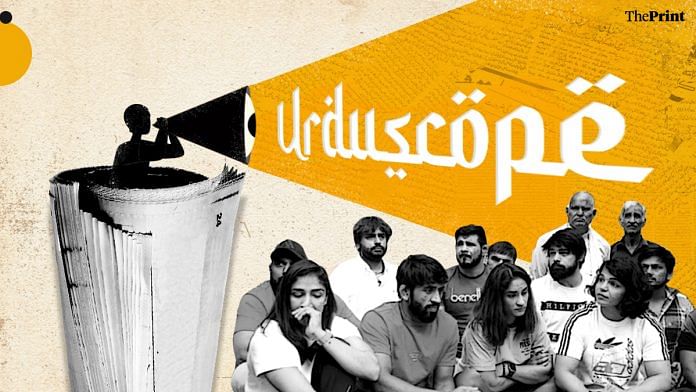New Delhi: The wrestlers’ protests at Delhi’s Jantar Mantar were widely covered by the Urdu press, with editorials calling for immediate action against Wrestling Federation of India (WFI) president Brij Bhushan Sharan Singh, who has been accused of sexually harassing at least seven women wrestlers.
Other developments that were covered prominently included the Supreme Court’s ruling on divorce, the violence in Manipur, and the 10 May Karnataka assembly polls.
ThePrint brings you a roundup of all that made headlines in all three prominent Urdu newspapers — Roznama Rashtriya Sahara, Inquilab, and Siasat — this week.
Wrestlers’ protest and Manipur violence
The ongoing wrestlers’ protest against WFI chief and BJP’s Kaiserganj MP Brij Bhushan Sharan Singh, and the late-night scuffle between them and Delhi Police personnel Wednesday kept the Urdu press buzzing.
Led by some of India’s top names in wrestling, such as Vinesh Phogat, Sakshi Malik, and Bajrang Punia, protesters have been demanding action against Singh and want the findings of an oversight committee inquiring into the allegations to be made public.
On 30 April, Siasat claimed in its editorial that Brij Bhushan is a powerful ‘bahubali’ politician with a ‘criminal background’ who has shown his might on several occasions. His continuance in office under such circumstances could come in the way of an impartial investigation, the editorial said.
In an editorial on 3 May, Inquilab stated that women athletes are raising their voices against exploitation, but it’s a shame that no action has been taken against the person facing these allegations. Shouldn’t the rulers of the country think about why the justice system has become so weak and ineffective in the face of such leaders and why the cries of women go unheard, the editorial asked.
The piece was carried a day after the scuffle between the protesters and police at Jantar Mantar. Demonstrators alleged that the policemen attacked them after an argument over occupying vacant spots at the protest site.
All three newspapers also prominently covered the clashes in Manipur.
Clashes erupted between Manipur’s Kuki tribes and the majority Meithei community following a ‘tribal solidarity march’ called by the All India Tribal Students’ Union of Manipur. The march was held to demand that the state’s Meitei community be included in the Scheduled Tribes Category.
The clashes raged on for two days, forcing the state to impose Section 144 of the Criminal Procedure Code to prohibit large assembly and cut off mobile internet services. In addition, shoot-and-sight orders have been approved in “extreme cases”.
Also Read: ‘Hijab, halal over corruption, unemployment’: Urdu press says people angry with Karnataka govt
Supreme Court and divorce
All three Urdu papers prominently covered the Supreme Court’s 28 April directive against hate speech. In its order, the court directed states and Union territories to register cases against those who make hate speeches regardless of whether there is a complaint.
On 29 April, an editorial Sahara’s stated that since 2014, hate speeches have become a regular affair and that some leaders and even ministers appear to be publicly indulging in them. “Genocide” of Muslims and other minorities is being openly spoken about and through all of this, the State remains a silent spectator, the editorial said.
Siasat’s editorial that day was also about the Supreme Court’s directive. The court, it said, had made it clear that this was a serious issue that could affect the secular character of the country. In such a situation, it’s the responsibility of the police to act against those making such speeches, it said.
Urdu papers also covered the Supreme Court’s hearings on divorce. On 2 May, the papers reported the apex court’s ruling that it can grant divorce under Article 142(1) of the Constitution on the ground of “irretrievable breakdown” of a marriage.
This power, the court had said, could be exercised both in cases of divorce by mutual consent or if a party opposes it.
On Thursday, the SC agreed to admit a petition challenging the practice of talaq-e-hasan, a form of divorce by which a Muslim man can divorce his wife by pronouncing talaq once every month over a three-month period.
In an editorial on 2 May, Sahara stated that Indian courts were already overburdened, causing judicial delays. In such a case, if the Supreme Court has ruled that it would be possible to grant divorce without the mandatory six-month wait, then, instead of debating the ruling itself, it would be more pertinent to ask why the court had to issue such an order in the first place.
Other significant cases covered by the Urdu press were the ongoing hearings against the release of 11 convicts in the Bilkis Bano gangrape case. Bano, who was heavily pregnant at that time, was gangraped. According to the prosecution, fourteen members of her family — including her three-year-old daughter Saleha — were killed by a mob in Gujarat’s Randhikpur village, when they were fleeing during the Godhra riots in March 2002.
Karnataka elections
From the Election Commission of India’s action over bribery allegations against BJP candidate V. Somanna, to the BJP’s promise of a Uniform Civil Code and a National Register of Citizens (NRC) in its Karnataka manifesto, newspapers gave wide coverage to the ongoing election campaigning, which is now reaching its crescendo.
Wide coverage was also given to the Congress’s manifesto, which promised to act against organisations like the Bajrang Dal and Popular Front of India if voted to power.
In its editorial on 3 May, Siasat said that there was an attempt to mislead people with election surveys. Attempts are being made to influence and manipulate the voters, making the media, which is supposed to be independent and impartial, a party in the election, the editorial said.
(Edited by Uttara Ramaswamy)
Also Read: People accustomed to seeing every problem through lens of religion, says Urdu press on hate speech



